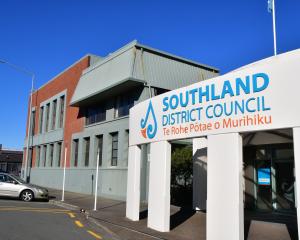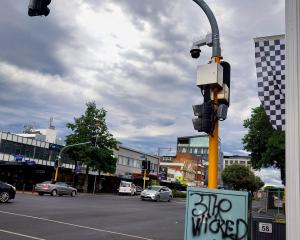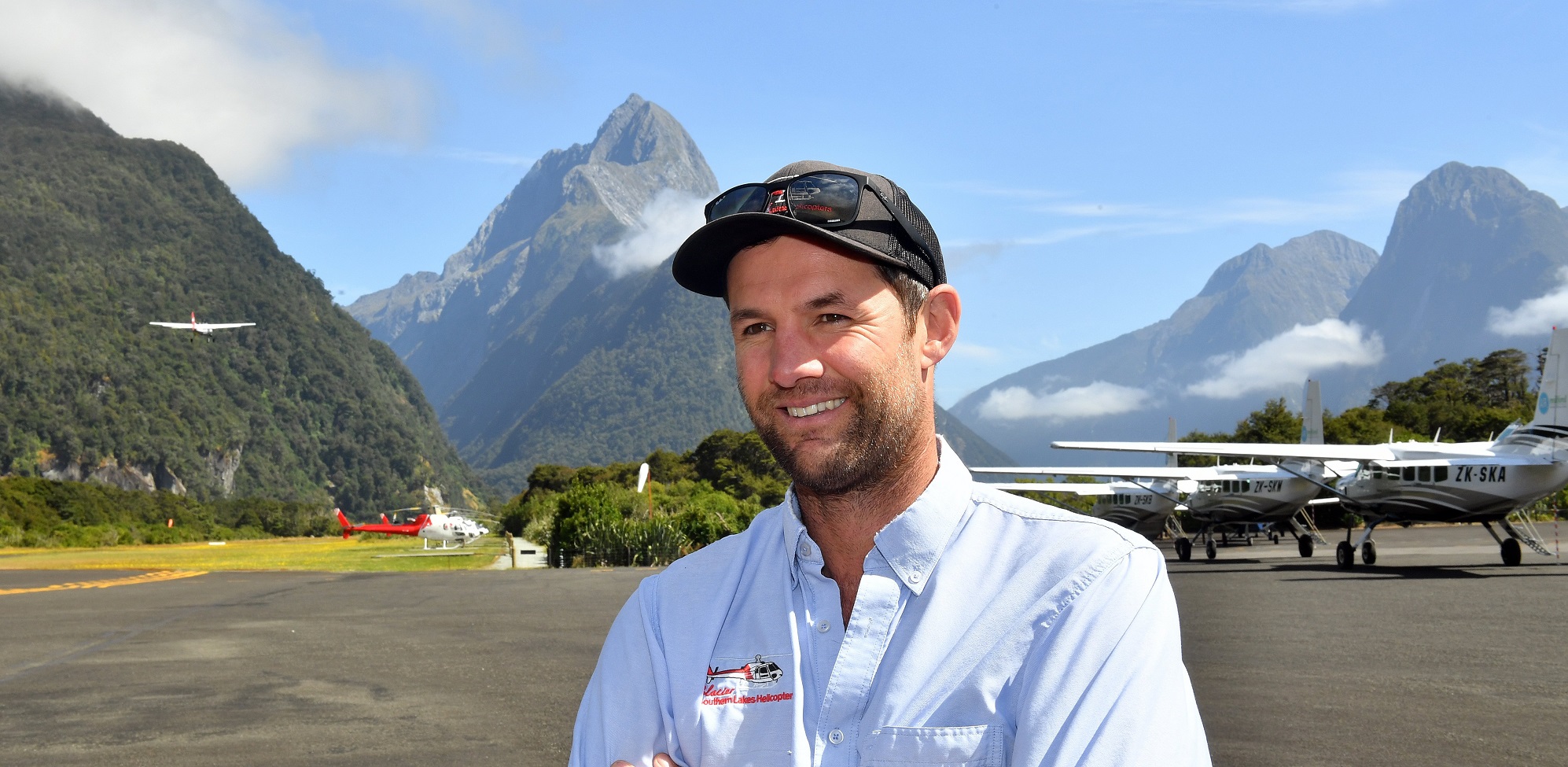
Most of its visitor and staff infrastructure was built years ago without culturally appropriate co-ordination and its future is far from certain. Many of the tourism companies that operate from here are pointing a finger of blame at the Department of Conservation (Doc), saying it has delivered decades of inept leadership.
A 10-year plan for the park ran out in 2017 and an $18 million planning exercise called the Milford Opportunities Project (MOP) delivered under-wraps ministerial recommendations last year followed by silence.
Grumpy operators describe the MOP as a waste of money. Ngāi Tahu describes it, in a report about values, as an opportunity to place cultural context and criteria centre stage and "provide economic pathways for Ngāi Tahu whanau".
Many fixed-term Doc permissions to run tourism businesses here, largely not in iwi ownership, have been expiring. There is a Treaty of Waitangi right for iwi to contest and pursue business opportunities fairly.
Everyone agrees there is no plan, no public funding and the public toilets are a disgrace. There is no community board to ensure people work together and as Piopiotahi’s longtime kayak guide and self-appointed mayor Rosco Gaudin points out, you can’t even cry over a beer. The pub shut down more than a decade ago.
He calls for Doc and regional authorities to be stripped of responsibilities and leadership changed.
"Milford is just chaos and, if anything, things have got worse since Covid ... The whole shebang needs to be cleaned out and restarted."
Expiring and likely contested
This year, about 800,000 people — three times the number 30 years ago — will photograph the fiord’s waterfalls from cruise boats, planes, helicopters and kayaks. They will likely spend about $200m.
Meanwhile, the expiring fixed-term permissions in Milford, called "concessions" and granted to companies running tours and occupying buildings, have been replaced with tenuous rolling or short-term agreements and some operators are struggling to see the sense in investing or do not have permissions to do so.
Milford Sound Tourism Ltd (MSTL), whose two main shareholders are the biggest cruise-boat operators, struck a deal with Doc in 1990 to build and run the cruise-boat terminal and neighbouring carparks, a breakwater, a sewerage system and more. MSTL was also required to take on the Knobs Flat campsite and loos halfway down the Milford road. The deal was funded by loans achieved thanks to a government guarantee, a government grant and a decision to raise ongoing tourist levies.
MSTL chairman Roger Wilson says the company thought it had permission to run things for 60 years until 2050, and had invested on that understanding, but has now been asked to accept that in 2028 its agreement will end and Ngāi Tahu will be given a chance to compete fairly for the same work.
Under section 4 of the Conservation Act 1987, there is a requirement for Doc to give practical effect to the principles of te Tiriti o Waitangi when making concession decisions on conservation land. Ngāi Tahu Holdings Corporation chief executive Todd Moyle says the corporation "recognises the economic potential of Piopiotahi and remains open to exploring future investment opportunities".
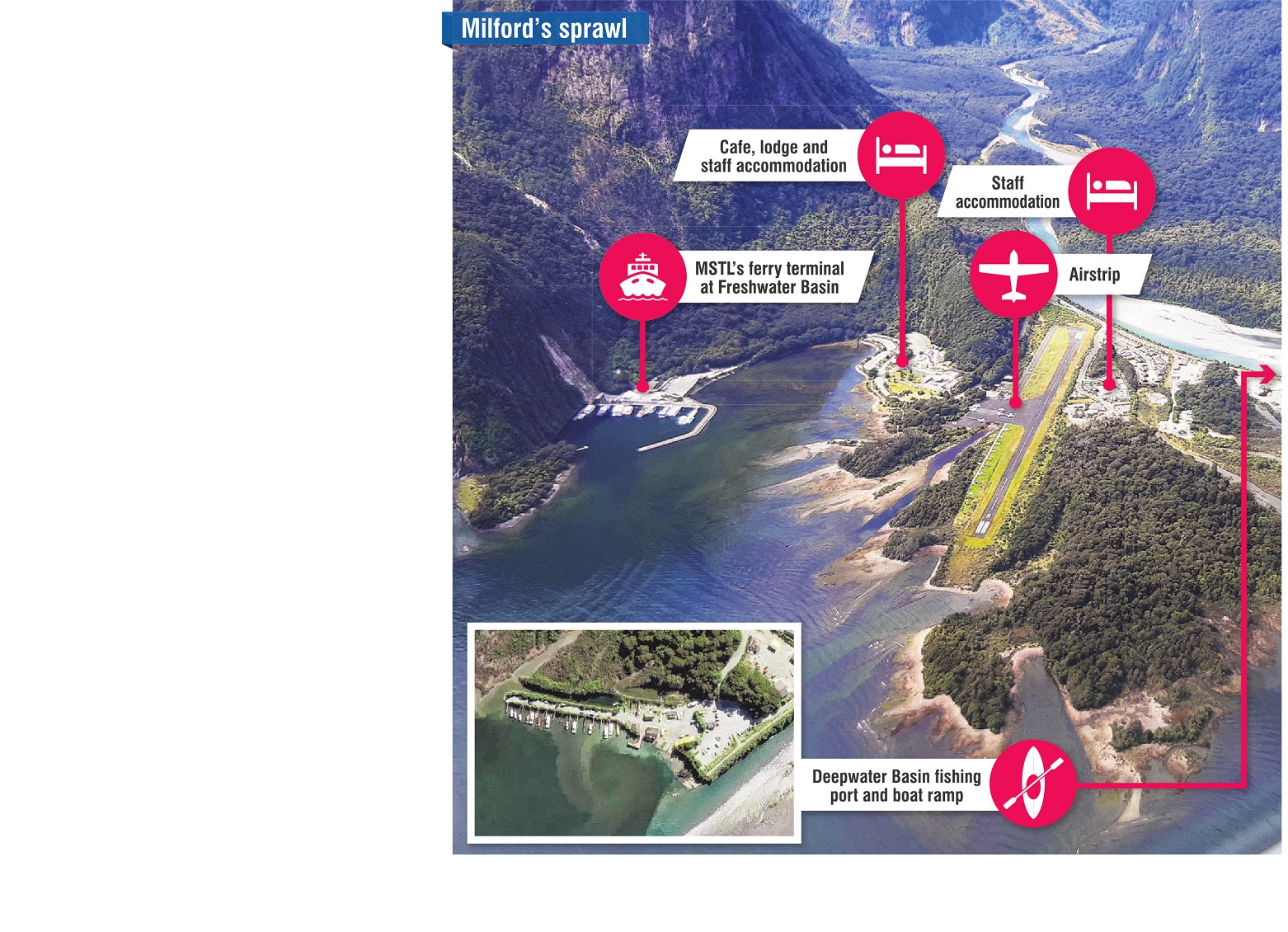
"The ability of Doc to plan and run Milford is very low. I have said that to ministers and will say it to anyone. It lacked the governance to come up with a realistic plan."
Private interests
The shareholders behind MSTL, and a name change it undertook in 2016, form an interesting side story highlighting lack of public authority in Milford.
The story goes that former Queenstown mayor and businessman Sir John Davies, who owns Trojan Holdings which has business interests in Milford, was the man who galvanised its set-up in the late 1980s.
He hosted a meeting in a Frankton hotel room attended by two other people running the only two cruise boat operations in Milford at the time. One was the boss of the government’s Tourist Hotel Corporation (THC), which ran the state-owned Red Boats cruises, later rebranded Southern Discoveries. The other was Sir Leslie Hutchins, part of the Hutchins family that developed Fiordland Travel in the 1950s, later becoming Real Group which runs RealNZ cruises.
Sir John jokingly said the doors were locked and nobody could leave until the Milford problem was solved. It did not sound like Ngāi Tahu was invited.
By December 1990, the Milford Sound Development Authority (MSDA) was set up. It was a name suggestive of an organisation with public ownership and its intent, described in its registration documents, was to "recreate, increase, develop, expand, upgrade, manage and advertise the public facilities and amenities at Milford Sound so as to attract and service trade, tourists, visitors and the general public".
There were, however, only two main shareholders. THC and Fiordland Travel were given 49% each and the Southland District Council took 2%. At first glance, it could appear that this meant 51% state ownership, but it didn’t. Six months earlier, on June 15, 1990, THC had been sold off to a hotel chain as part of a government asset firesale.
The Red Boats formerly owned by THC then changed hands several times. MSDA documents from later in the 1990s list Tourism Milford Ltd. A company by that name is owned now by Sir John’s Trojan Holdings. Rebranded Southern Discoveries, the cruise company was eventually picked up by the Skeggs Group in 2015, owned by the rich-list Skeggs family empire, built up by former Dunedin mayor Sir Cliff Skeggs.
It took 26 years, in 2016, for the MSDA to reregister as a company and change its name to MSTL, but it has always been run by two big cruise boat operators and only ever been 2% public owned.
The operators have, of course, benefited from a cruise-boat terminal with plenty of loos the MSDA had built by 1992 and that leads straight to their shareholders’ boats. It is now ageing.
Meanwhile, the airport has never had a terminal and Mr Gaudin’s kayaking clients, round the corner at Deepwater Basin, get changed in a tent and use a semi-derelict toilet block owned by Doc. Mr Gaudin calls Deepwater Basin "the ghetto".
There is certainly no visitor centre, anywhere, reflective of the huge cultural status of Ngāi Tahu or Piopiotahi’s world heritage status.
Businesses band together
Unsurprisingly, a number of companies, including MSTL and its shareholders, some tour operators, a private power company called Milford Sound Infrastructure and others have formed a lobby group called Destination Milford Sound (DMS). It is clamouring for permission to make decisions plus public investment.
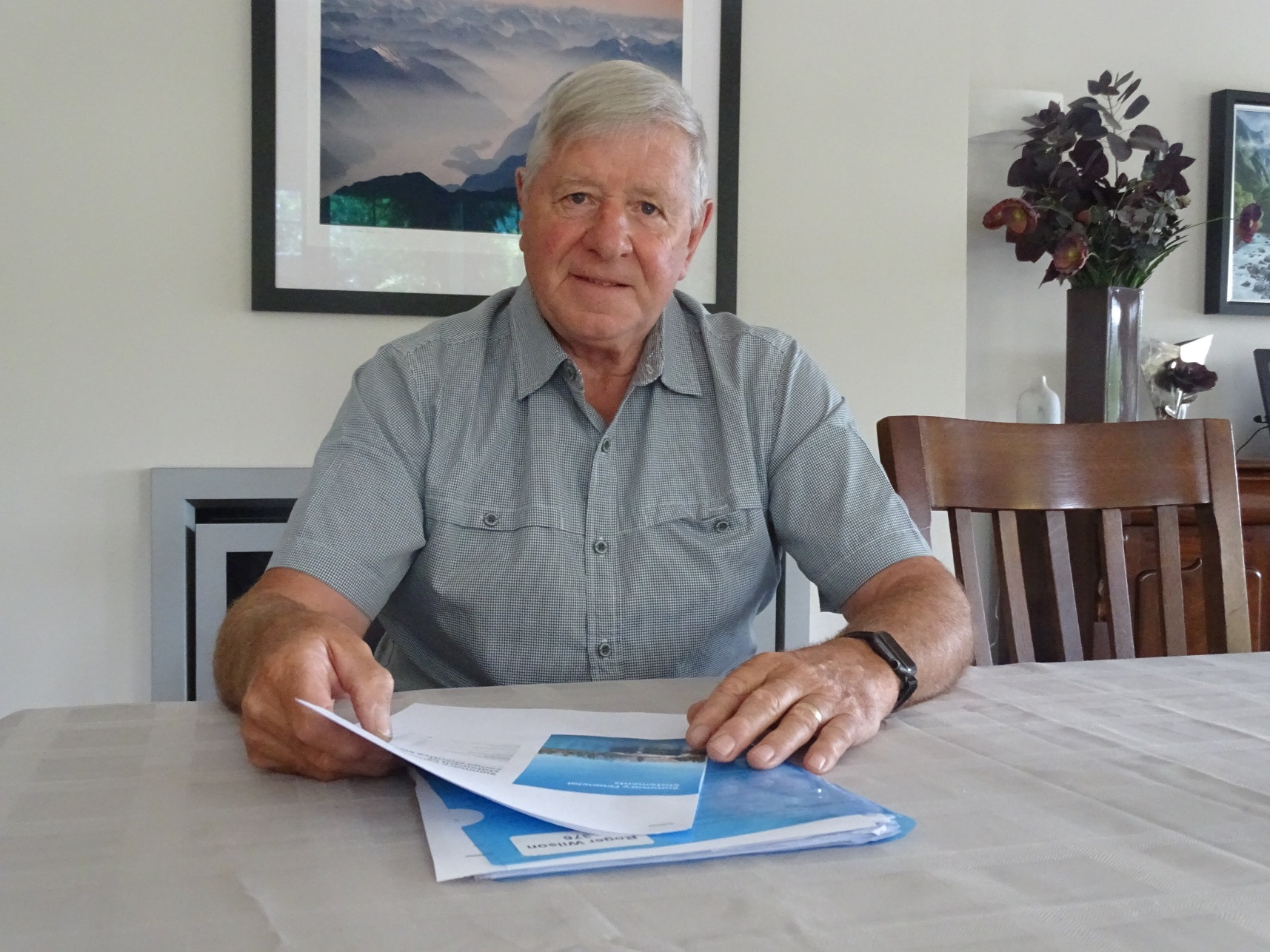
DMS chairman Mark Quickfall is director of Totally Tourism, which owns a handful of helicopter companies and a cruise company.
"Everyone is crying out saying we can do better at Milford, but how can we do better if we can’t invest?" he said.
There is the ultimate concern that banks may pull the pin. However, there is no doubt that post-Covid Piopiotahi has lucrative prospects due to rising visitor numbers and big players are hanging on and investing, including in aviation tourism.
Aviation operators say they have upgraded planes and helicopters and been aghast at an idea tabled by the MOP to stop planes using the busy runway. James Stokes, boss of helicopter company Glenorchy Air, says planes are important for emergency mass evacuations but aviation operators were asked by the MOP where else they could fly off to, rather than consulted properly.
"They [the MOP] haven’t taken anyone along with them. It is a shame."
Glacier Southern Lakes Helicopters was in Ngāi Tahu ownership for a few years and then sold to Luke McEwan, who says Milford suffers from "no certainty, which is same old, same old. We need to know the future."
Visitor accommodation can also be a money-spinner. The Skeggs Group has a third of the shares in Milford Sound Lodge, which managed to get permission for upgrades and rents chalets for about $1000 a night.
Sir John Davies’ company Trojan Holdings runs Ultimate Hikes, the guided walk on the Milford Track with private lodges. Clients pay rates of about $3000 and more, compared with under $300 to stay in the Doc huts.
Trojan director Paul Anderson says the company reapplied for its concession to run the guided walk in 2019 and has "been in discussion with Doc since". It wants to undertake a multimillion upgrade of its Mitre Peak Lodge in Milford.
"It [the lodge] is one of many examples in Milford of a private company wanting to invest but if we can’t get security of tenure from Doc the business case is just not there ... To achieve that is going to need the Crown to make decisions on tenures and provide investment for the public infrastructure. Then the whole region and nation can have economic benefits."
Acknowledgement of mana whenua
RealNZ declined to comment about MSTL or its cruise business but Southern Discoveries chief executive Kerry Walker did give a statement, stressing the need for tenure and saying there needed to be a "balanced plan that protects Piopiotahi’s environment and culture while supporting both visitors and operators through fair, transparent processes".
Southland District Council chief executive Cameron McIntosh says he has no idea how the council ended up with a 2% holding in MSTL. The council only had normal territorial authority to do things such as check Milford’s buildings complied with the Building Act.
He described stalled processes at Milford as a "general frustration".
"It would be helpful for everyone to get a stronger view about the future so decisions about investment in infrastructure can be made and we also recognise it is very, very important to mana whenua and no-one is losing sight of that."






